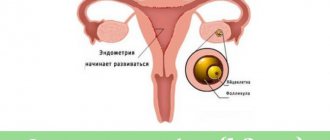In vitro fertilization (IVF) is an assisted reproductive technology (ART) that is used for infertility and some hereditary diseases. The method is used in situations where natural conception is impossible. IVF is the artificial fertilization of an egg in a laboratory followed by transfer of the embryo into the uterus. The blastocyst continues to develop in natural conditions, is implanted into the wall of the uterus and further develops, as during natural conception. Depending on the health conditions of the partners, various options for IVF programs can be used. The selection and implementation of a specific protocol is carried out by a fertility specialist. Correct implementation of the program and rational organization of each stage increase the chances of successful implementation of the reproductive function by each of the participants.
How to prepare for the IVF procedure
If a couple plans to participate in an IVF program using their own genetic material, rather than donor material, it is advisable to pay attention to preparatory measures in advance. The chances of success are determined by the health of both partners. You should start improving it 3-4 months before conception and continue until the arrival of a new family member.
When planning parenthood, it is advisable to pay attention to the following activities:
- To refuse from bad habits. Drinking alcohol and smoking adversely affect the entire body. Bad habits disrupt the functioning of internal organs, provoke permanent hormonal imbalances, and also cause chronic intoxication. Quitting smoking and alcohol abuse contributes to a more predictable course of the stages of the IVF program and reduces the likelihood of genetic abnormalities in the child, as well as complications during the development of pregnancy and childbirth.
- Adjust body weight. Excess weight is often the cause of infertility in couples. Adipose tissue produces hormones and other bioactive substances. Excess fat in the body increases the overall inflammatory background. Losing body weight helps balance the endocrine system and increase the chances of a successful IVF program on the first try.
- Rationalize your lifestyle. The absence of a regime adversely affects all organs and systems. Mainly, the body’s resistance to stress decreases, which provokes hormonal disruptions and subsequently can reduce the effectiveness of reproductive technologies. When preparing to become parents, you need to pay attention to organizing your work and rest schedule. It is advisable to wake up and fall asleep at the same time, organize the optimal duration of night sleep, maintain mental hygiene and minimize stressful situations.
- Optimize physical activity. A moderately active lifestyle can be considered healthy. Active recreation in the fresh air and fitness breaks during static work are encouraged. If future parents are actively involved in sports, they will have to, on the contrary, reduce the pace of physical activity. Prolonged and intense strength training has an adverse effect on the body. It is better to replace exhausting exercises with relaxing activities (Pilates, yoga, swimming) and supplement them with walking in nature.
- Balance your diet. The quality of nutrition in preparation for conception is important for both parents. It is necessary to ensure sufficient intake of protein, healthy fats, fiber and antioxidants. It is appropriate to limit the consumption of simple carbohydrates, processed foods, foods with food additives and smoked foods.
- Protect yourself from infections. Some infectious diseases can cause problems during pregnancy. The expectant mother should be screened for TORCH infections and checked for rubella antibodies. If you lack immunity to potentially dangerous pathogens, it is advisable to get vaccinated in advance.
- Start taking vitamins. At the stage of preparation for pregnancy, it is worth discussing with your doctor the need to use vitamin and mineral complexes. Women are usually prescribed folic acid, Omega-3, iodine. If future parents are already taking any supplements, they must be reported to a fertility specialist. Some of them may have to be cancelled.
In general, preparing for pregnancy involves a healthy lifestyle. An integrated approach can significantly improve health indicators without taking any medications. However, you need to understand that positive changes in the body do not happen in one day. The above actions should be done regularly.
If pregnancy does not occur within 6-12 months of active sexual activity without contraception, the couple will be offered ART. Preparedness will help future parents achieve the desired result.
Diagnosis of infertility
The diagnosis of infertility is made by a reproductive specialist. According to the WHO definition, a married couple is considered infertile if, subject to regular unprotected sexual intercourse for a year, they were unable to conceive a child.
After the diagnosis is established, an examination is prescribed. They usually start with an examination of the man: the first study that needs to be done is a spermogram. The study is carried out for several hours and based on the result you can immediately tell whether the man is fertile (that is, can conceive a child), and whether he needs to undergo any additional research and treatment. The expectant mother faces a longer journey: it is necessary to understand the condition of the ovaries - whether there are eggs in them, the condition of the uterus, and the patency of the tubes. At the first examination, the patient undergoes an ultrasound, tests are prescribed for hormones, infections, and a tube examination is performed (X-ray or ultrasound).
Sometimes for a final diagnosis it is necessary to resort to surgery - laparoscopy. Spouses, in some cases, need to be examined “for compatibility” - to conduct a Kurzrock-Miller test. The data obtained enable the reproductologist to develop a treatment plan. Finally, it is necessary to conduct a full examination to clarify whether there are any contraindications to IVF (or other planned procedures) and pregnancy.
What examinations and tests need to be taken before IVF?
When a couple contacts the Reproductive Health Center regarding an IVF program, a comprehensive examination of both partners is initially carried out. This is necessary for an objective assessment of the health status of men and women, identification and correction of the causes of infertility, assessment of the chances of pregnancy as a result of IVF and proper preparation of partners for the program.
A man's fertility is checked quite simply. For this purpose, a laboratory study of the ejaculate (spermogram) is carried out. The test reflects the presence, concentration and morphological properties of germ cells in the seminal fluid. The spermogram results objectively reflect the state of male reproductive function. Additional examination is usually prescribed if abnormalities in the composition of the ejaculate are detected. In order to identify the causes of male infertility, the following are prescribed:
- urological examination (urethral smear analysis, PCR tests for sexually transmitted infections, ultrasound of the pelvis, scrotum and prostate organs);
- hormonal examination (study of pituitary hormones, thyroid gland, levels of sex steroids);
- general clinical examination (blood and urine tests, biochemical tests, ultrasound of internal organs, determination of blood group and Rh, fluorography).
Diagnosis of female infertility begins with a gynecological examination, which consists of the following activities:
- Ultrasound of the pelvic organs;
- Ultrasound of the mammary glands;
- gynecological examination;
- analysis of smears for flora;
- cytological examination of a smear from the cervical canal;
- tests for sexually transmitted infections.
For clarifying purposes, MRI of the pelvis, endometrial aspiration biopsy, hysteroscopy, hysterosalpingography (examination of the uterus and fallopian tubes, including determination of patency) and folliculometry may be prescribed.
An endocrinological examination involves assessing the levels of thyroid, pituitary, adrenal and sex hormones. Advanced diagnostics, which are required when abnormalities are detected, include ultrasound of the adrenal glands, thyroid gland and MRI of the pituitary gland.
Women's general clinical examination is more extensive (compared to men's). This is due to the increased load on the expectant mother’s body at each stage of IVF and after pregnancy. Women are prescribed general clinical and biochemical blood tests, urine tests, ultrasound of internal organs (liver, gall bladder, pancreas and kidneys), electrocardiography, fluorography, tests for blood group and Rh factor.
If during the examination any abnormalities in the body are identified, consultations with highly specialized specialists are prescribed and treatment is carried out according to indications. The implementation of the IVF program begins after complete recovery or achievement of stable remission (in the case of chronic diseases).
Pregnancy control and support
After embryo transfer, the woman is prescribed hormonal medications for the normal development of pregnancy. Its confirmation is carried out after 2 weeks using a blood test for hCG. After another 1 week, the woman undergoes an ultrasound scan. Pregnancy is diagnosed if a fertilized egg is detected in the uterus using ultrasound.
Now you know how IVF goes step by step. Don't be afraid of this procedure. This is a safe and highly effective method of overcoming infertility. Thanks to IVF, hundreds of thousands of married couples around the world have already become happy parents.
In what cases is IVF performed? Indications
IVF programs are used for infertility in one or both partners. This diagnosis is established if eliminating the cause of fertility disorders does not lead to pregnancy. The time frame within which IVF can be performed is determined individually, taking into account the etiology of the disorders, the age of the partners and other factors.
Indications for IVF may include the following conditions:
- deviations in the anatomy of the genital organs in a man or woman that make conception impossible;
- endocrine pathologies;
- genetic or immune disorders;
- idiopathic infertility (reasons are unclear);
- lack of a sexual partner for a woman who wants to have a child;
- implementation of reproductive function in same-sex marriage.
IVF can be used in situations where both partners are physically healthy, but conception does not occur for unknown reasons. In modern reproductive medicine, the use of ART is not delayed for long. Statistics indicate that over time, the likelihood of successful program implementation decreases, because As a woman ages, the number of eggs in the ovaries (ovarian reserve) decreases and chronic diseases may appear.
Indications
- decreased fertility;
- if conservative methods did not help;
- the desire of the married couple;
- for a girl without a partner using donor programs;
- violation of the patency of the oviducts (fallopian tubes);
- amputation of appendages;
- the likelihood of conception with IVF is higher than with other options;
- after preliminary treatment of endometriosis;
- disorders of the menstrual cycle that cannot be corrected and do not allow one to become pregnant;
- ineffectiveness of artificial insemination;
- lack of menstrual flow for some reason (anovulation);
- infertility of unknown pathogenesis (idiopathic);
- problems with spermatogenesis in men, poor quality of seminal fluid, ejaculatory dysfunction.
How is in vitro fertilization performed? Main stages
The IVF method is a generally accepted method of treating infertility in the world, which involves conception in a laboratory setting. Conventionally, the IVF procedure takes place in 3 stages:
- Obtaining germ cells. This stage involves the collection of sperm from a man and eggs from a woman. If necessary, donor material is used.
- Embryo preparation. As part of IVF, fertilization occurs under special conditions. The first stages of embryo development occur in vitro.
- Implantation. The embryo is transferred to the expectant mother's uterus, where it implants in the endometrium. After this, pregnancy is expected. Further development takes place in natural conditions.
The program is described in a very simplified manner, since each of its stages can occur with its own peculiarities. Types of IVF are usually called protocols.
Fertilization of eggs
On the same day, fertilization of the eggs is carried out. For this purpose, the sperm of the spouse (if necessary, a donor) can be used. Therefore, the husband must also come to the clinic on the day of the follicle puncture to donate sperm.
Sometimes frozen (cryopreserved) sperm is used. This is usually required in cases where:
- the husband has little sperm, and it needs to be accumulated before the fertilization procedure;
- The husband does not have time to come on the day of the follicle puncture, and he donates sperm in advance.
Frozen sperm is also usually used if there is a need to fertilize eggs using donor biomaterial. Donor sperm may be required for single women or if the husband is completely infertile.
IVF protocols
IVF programs must be adapted to the clinical case. Taking into account the specific health conditions of the expectant mother and the need for additional manipulations, a specific type or protocol of in vitro fertilization is selected. This allows you to minimize the burden on the female body, reduce the risk of complications, and also increase the effectiveness of ART. Currently, the following IVF protocols are used in reproductive medicine:
- Short. Starts from the 1st day of the cycle and ensures a reduction in the duration of the program.
- Super short. Involves minimal ovarian stimulation.
- Long. Begins before menstruation, allows you to correct the functioning of the pituitary-ovarian axis.
- Long with soft stimulation. Allows you to optimize the process of egg maturation. This IVF protocol includes an additional stage of inhibition of folliculogenesis.
- Natural - without stimulation, which is a mandatory step for other IVF protocols.
- Cryoprotocol. It is carried out using previously cryopreserved (frozen) germ cells or embryos.
Thus, what is included in IVF depends on the type of protocol. The type of program is determined by the characteristics of the clinical situation.
Why choose us
In vitro fertilization is carried out in a medical center according to international medical protocols.
Other advantages:
- individual schemes;
- diagnostic department, where you can undergo all types of examinations;
- its own embryological laboratory operating according to American standards, cryobank, sperm and oocyte bank;
- implementation of various programs, including donor and surrogacy;
- use of high quality medicines;
- constant contact with the attending physician;
- availability of all ART;
- qualified employees;
- comfortable conditions;
- the IVF success rate is above the national average.
How does the IVF protocol work?
The most commonly used are long and short IVF protocols with the same steps. Differences in terms, drugs and stages of IVF by day of the cycle. As an example, it is more convenient to consider a short version of the program, which is implemented as follows:
- Controlled ovarian stimulation. The goal of the stage is superovulation or the maturation of a large number of follicles (10-20 pieces). To achieve this, hormonal drugs are prescribed. The list and doses of hormones are determined on a personal basis. As a rule, therapy begins on the 2nd day of the cycle and lasts 8-10 days. In most cases, drugs are administered by injection. The process of follicle maturation is monitored using ultrasound folliculometry. The procedure is carried out at intervals of 2-4 days in order to accurately determine the onset of egg maturity.
- Follicle puncture. When the follicles reach a certain size, hormonal stimulation of ovulation is carried out. A hormone is introduced into a woman’s body that accelerates the maturation of the egg. After 32-34 hours, the follicles are punctured. The procedure is carried out in a state of medicated sleep, which eliminates any unpleasant sensations. During manipulation under ultrasound guidance using a long needle, the doctor obtains follicular fluid. The material is placed in special tubes, which are immediately transferred to the embryology department for further processing. The woman is under the supervision of medical personnel for several hours, after which she can return home. On the same day, the man donates sperm (by masturbation, after 3-5 days of abstinence).
- Embryological stage. The eggs obtained during puncture are examined for viability. The best oocytes are placed on a nutrient medium in an incubator, where conditions close to physiological are observed. The ejaculate also needs to be processed. Morphologically correct motile cells are obtained from it in a certain concentration, which are then transferred to the eggs. After fertilization, the stage of embryo cultivation begins, which lasts up to 6 days (until the formation of a blastocyst) and involves regular monitoring of the zygote development process to assess viability.
- Embryo implantation stage. Two good quality blastocysts are transferred into the uterine cavity using a catheter. In case of doubtful viability, it is possible to implant a larger number of embryos in order to increase the chances of pregnancy. The remaining embryos are subject to cryopreservation in case of failure of the protocol. This allows you to avoid repeated stimulation and puncture of the ovaries. Parents can save the material for the next pregnancy or pass it on to other couples.
Variations are possible at any stage of the program. For example, if ovulation is preserved, you can start with IVF in a natural cycle, which means there is no stimulation stage and no serious interference in the woman’s hormonal background. Minimal stimulation can be performed to obtain several germ cells. This approach is relevant for preserving the ovarian reserve. Women who are physically unable to carry a pregnancy undergo IVF with the help of a surrogate mother. In this case, the couple's genetic material is used, but the embryo is implanted in the gestational courier's uterus.
Stimulation of superovulation
A woman is prescribed hormonal drugs to stimulate the maturation of several eggs at once. With a good ovarian reserve, about 10 follicles mature in one cycle. From most of them it will be possible to obtain high-quality eggs in the future.
The stimulation scheme is selected for each woman individually. There are many types of IVF protocols. Special hormonal drugs are used to stimulate ovulation. The main criteria for choosing a stimulation regimen and dosage are the woman’s age, her ovarian reserve and previous stimulation experience.
Sometimes this step is missing. IVF in women with low ovarian reserve is often performed in a natural cycle. That is, hormonal drugs are not prescribed for the maturation of a large number of eggs.
Luteal phase support during IVF
The luteal phase is characterized by the development of the corpus luteum at the site of the bursting dominant follicle. The corpus luteum synthesizes hormones necessary for the onset and maintenance of pregnancy. In the natural cycle, the corpus luteum functions better than in the artificial one. As part of the IVF protocol, this phase is supported by medication. The woman is injected with appropriate hormones, which facilitates pregnancy. Medication support may be required throughout the first trimester, and sometimes longer.
What to do after IVF? Recommendations
IVF does not require a woman to radically change her lifestyle. Some restrictions are relevant immediately after the procedure of transferring the embryo into the uterine cavity and are associated with the need to ensure optimal conditions for the embryo. In the post-procedure period, a stay in the clinic for an hour is indicated. In the next 2 weeks, it is advisable to refrain from:
- stress;
- physical activity;
- lifting weights;
- thermal procedures;
- sexual contacts;
- using medications without the consent of a doctor.
14-16 days after implantation of the embryo, laboratory diagnosis of pregnancy is carried out. After some time, the location of the fertilized egg is monitored using ultrasound.
Pregnancy resulting from IVF is not much different from natural pregnancy. The patient will regularly visit an obstetrician-gynecologist, undergo standard diagnostic procedures and take prescribed medications. It is advisable to lead a moderately active lifestyle, eat rationally and take care of a favorable psycho-emotional background. If you feel unwell, you must contact your doctor as soon as possible and strictly follow his recommendations.
If IVF fails, the woman begins to menstruate. The nature and volume of discharge may differ from usual. A reproductive specialist carefully studies the clinical case and prescribes the tests necessary to determine the reasons for the failure. A woman can participate in the program repeatedly (usually the minimum interval is six months). In this case, the protocol must be adjusted taking into account the specifics of the current situation.
Embryo transfer
1 or 2 embryos are transferred into the uterus, depending on how the chances of pregnancy are assessed. When transferring 2 embryos, the success rate is higher. However, the risk of multiple pregnancies also increases.
The transfer procedure itself is simple and painless. It only lasts a couple of minutes. Using a special device that resembles a syringe with a flexible tube at the end, the embryo is placed into the uterine cavity. If the embryo is successfully implanted into the endometrium (the lining of the uterus), pregnancy occurs.
The likelihood of pregnancy after IVF
The chances of pregnancy as a result of IVF correspond to those with natural conception and are equal to 50-70%. Taking into account the fact that a certain percentage of artificial pregnancies are terminated, the effectiveness of the method is about 40%.
The results of the procedure depend on many factors (the cause of infertility, the general health of the parents and their age, the number of unsuccessful attempts, the correct selection of the protocol and the implementation of each of its stages, the individual response of the woman’s body to drug treatment, etc.). The negative outcome of the first protocol is not a reason for despair. Adjusting the program to account for the reasons for failure increases the effectiveness of the following protocols. According to statistics, most successful pregnancies occur as a result of the second IVF attempt.
History: how IVF developed in Ukraine and the world
Before the landmark event in the world of reproductive medicine, the birth of the first IVF child, experiments on embryo cultivation “in vitro” with its subsequent transfer were carried out only on mammals. As a result of one such experiment and thanks to the talent of the Chinese scientist Ming Chue Chang, a rabbit was born in 1959, proving with its appearance that artificial insemination is a promising new reality.
And exactly 19 years later, in 1978, two fathers of reproductive medicine - gynecologist Patrick Steptoe and biologist Robert Edwards, from Great Britain, performed the miracle of the birth of the first human in vitro - Louise Brown.
The progenitor of reproductive medicine in Ukraine was the Kharkov scientist, academician, doctor of medical sciences, professor Valentin Ivanovich Grishchenko. He was the first in Ukraine to organize a human reproduction laboratory in 1983 (later it received the well-known name “Implant”) and began to use assisted reproductive technologies. In 1990, for the first time in Ukraine, under his leadership, successful in vitro fertilization was carried out, after which an IVF girl, Katya, was born in 1991.
The work of the founder of IVF in Ukraine is continued today by his grandchildren - Nikolai Grigorievich Grishchenko and Valentin Yuryevich Parashchuk. Thanks to the talent and professionalism of the Grishchenko medical dynasty, today the IVF clinic , named in honor of Valentin Ivanovich - “Clinic of Academician Grishchenko”, is successfully operating.










